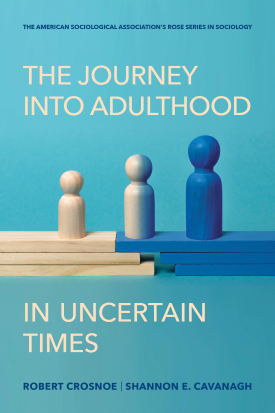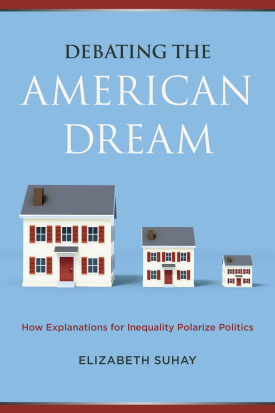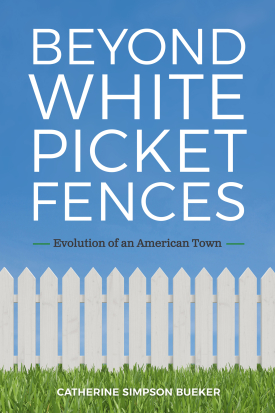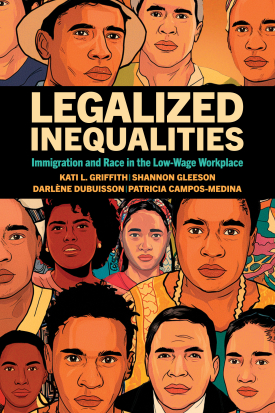
The Journey into Adulthood in Uncertain Times
About This Book
"The timely arrival of this brilliantly written theoretically and scientifically sound interrogation of transitions to young adulthood could not be more fortuitous. As fundamental social, cultural, and economic necessities for positive adult development are being reconstituted based on ‘imaginary wisdom’ and romanticized notions of certainty and success ascribed to select populations of society, it is imperative that decision-makers who are contextually and politically gambling with the life chances of current and future generations of young adults read this book. Your ‘aha’ moment awaits."
—LINDA M. BURTON, University of California, Berkeley
"The Journey into Adulthood in Uncertain Times is a joy to read. The authors have provided a scholarly and stunning glimpse into the lives of young adults in America today. They persuasively argue that the journey from the late teens through the early twenties is not as fraught as some commentators would have us believe, nor is it hewing to the patterns seen earlier. America’s youth are neither a lost generation nor a lockstep generation. The piercing of myths is as delightful as it is real (or as the authors say, messy). The combination of a national longitudinal survey, responses to a series of questions about youths’ lived experiences, and context-setting cross-sectional yearly data on economic, educational, and work conditions as well as alcohol use and depression is brilliant. The window into the journey from eighteen to twenty-six years is nuanced, avoiding generalizations and instead focusing on different pathways. Robert Crosnoe and Shannon Cavanagh ‘thread the needle’ between looking at development within youth and trends across youth—a difficult feat! I am particularly taken by the distinction between ‘hard times’ (economic vulnerability) and ‘uncertain times’ (rapid changes in political conditions, technological growth, institutional trust, and demographic trends). The authors make a beautiful case that both contribute to development within and across youth—and are prescient in predicting their contribution to future youth. The book concludes with a discussion of much-needed policy initiatives geared to this specific life phase, which is often overlooked, as well as a warning that difficulties some youth experience are due to hard and uncertain times (social trends) rather than youth predispositions. In a sense, this critical look at youth might be seen as a wake-up call for all of us in terms of the challenges that youth face today."
—JEANNE BROOKS-GUNN, Columbia University
"Robert Crosnoe and Shannon Cavanagh have produced an invaluable resource for scholars of the life course in general. The Journey into Adulthood in Uncertain Times is a notable contribution to the literature on early adulthood and a worthy successor to the research conducted by the Network on Adult Transitions."
—FRANK F. FURSTENBERG, University of Pennsylvania
Concerns about the welfare of young adults have received increasing public attention. Numerous magazine and newspaper articles ask, “Are young adults failing to launch?” and “Are global crises creating generations of lost youth?” These questions are driven by worries that young people are either unable or unwilling to transition to adulthood, even when they have aged past traditional definitions of childhood and adolescence. In The Journey into Adulthood in Uncertain Times, sociologists Robert Crosnoe and Shannon E. Cavanagh examine whether young people today are either refusing or failing to grow up.
Drawing on both quantitative and qualitative survey data over five decades, Crosnoe and Cavanagh find that young adults are, in fact, waiting longer to take on “real” adult roles, such as worker or parent. However, this is not out of a reluctance to grow up. Instead, increased inequality and changes in the economy have forced young people to adapt their lives in new ways. Young adults are now spending more time in school, have more trouble finding their footing in the labor force, and consequently postpone getting married and having children. They also mix and match roles in more complicated ways now than in the past—going back and forth between school and work over longer periods of time or disconnecting parenthood from their romantic relationships. While the period from late teens to mid-twenties does look different now than in the past, the change has been slow and steady rather than a dramatic shift due to social crises. The Great Recession, for example, had a more muted effect on young people’s social and economic attainment and family formation than fears of a lost generation would suggest.
Crosnoe and Cavanagh find that while the panic over young adults today may be somewhat overblown, this conclusion should not obscure some clear concerns. Young adults do struggle with their social and emotional well-being. They are more depressed than their counterparts in previous generations, drink less alcohol in ways that suggest less engagement with social life, and express deep distrust of social institutions and the idea of the American Dream. The authors argue that worries about the state of young adulthood today should trigger more reflection about how to support young people rather than how to fix them.
The Journey into Adulthood in Uncertain Times is a comprehensive and illuminating examination of the challenges faced by contemporary young adults.




